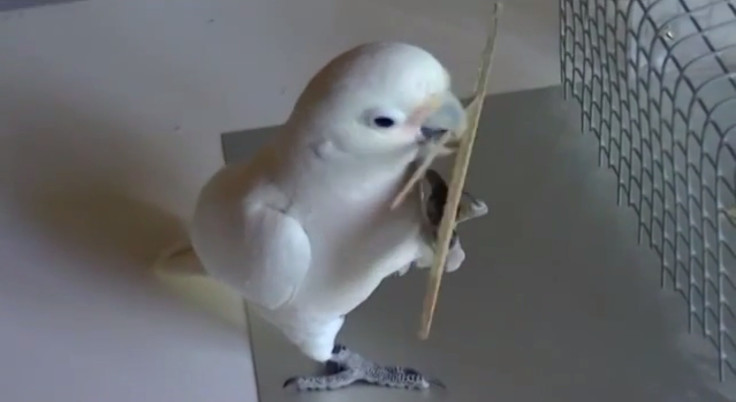'Carpenter' Cockatoos Learn Tricks of the Trade from One Another

Cockatoos can learn to make and use wooden tools by copying one another, scientists have discovered.
In what is believed to be the first controlled experimental evidence of the social transmission of tool use in any bird species, researchers found Goffin's cockatoos – a species of Indonesian parrot – learned to make and use sticks to get treats.
The team, from Oxford University, the University of Vienna, and the Max Planck Institute at Seewiesen, noted that Goffin's cockatoos do not use tools in the wild.
However, a captive male adult called Figaro spontaneously started making stick tools out of aviary beams to rake up nuts far out of his reach.
The researchers wanted to see if this behaviour could be passed to other cockatoos and used Figaro as a teacher, who demonstrated his tool use to his students.
In one experiment, the student cockatoos were able to watch Figaro using a readymade stick to obtain a nut. In another, they saw a tool being controlled by hidden magnets to move the nut towards them. All the birds were then put in the same situation as Figaro had been, with a tool ready to be used.
The birds that saw Figaro's demonstration interacted with the tools more than the other group, picking up the stick and trying to get the nut. Three of the six birds were able to use the stick like Figaro, not only copying his movements, but also his tool-wielding techniques.

However, they also found the students managed to find a more efficient way to get at the nut by propelling the nut with a flipping movement, as opposed to adjusting the tool as the nut came closer like Figaro did.
After the study, two of the successful birds were offered tool-making material and one of them made his own tool from a wooden block, suggesting that learning to use tools stimulates tool-making.
Study leader Alice Auersperg said: "Although watching Figaro was necessary for their success they did not imitate his exact motor activities. Successful observers seemed to attend to the result of Figaro's interaction with the tool but developed their own strategies for reaching the same result, rather than copying his actions. This is typical of what psychologists would call emulation learning."
© Copyright IBTimes 2025. All rights reserved.






















